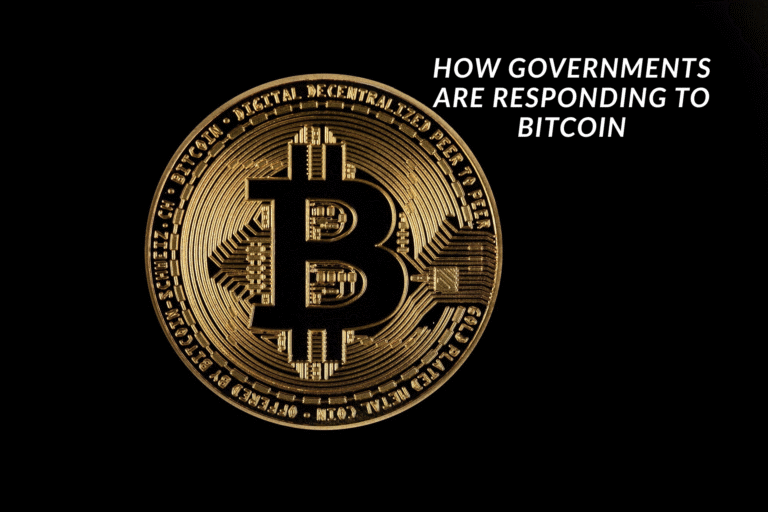How Governments Are Responding to Bitcoin: Globally, governments are responding to Bitcoin in a manner that strikes a balance between prudence. Bitcoin poses a threat to established financial frameworks and monetary policies. While some nations accept Bitcoin as legal cash or a strategic asset, others strictly prohibit or restrict its use.
These differing answers are indicative of more general worries regarding taxation, financial stability, illegal activities, and technological advancement. This essay examines how many countries are negotiating the intricate terrain of Bitcoin. striking a balance between benefits and threats in a digital economy that is changing quickly.
How Governments Are Responding to Bitcoin.

Since its birth, Bitcoin has presented governments all around the world with both fresh opportunities and problems. As it develops, states are forced to make difficult choices about whether to outlaw, regulate, adapt, or welcome it due to its volatility, decentralization, and cross-border nature. The situation as of mid-2025 is examined below, including how various governments are handling Bitcoin.
Main Approaches by Governments.
Governments have generally responded by falling into several broad categories of policy:
- Ban or Restrict.
Bitcoin (and/or other cryptocurrencies) are still banned or subject to severe restrictions in some nations. Among the causes are worries about investor safety, financial stability, money laundering, and possible challenges to the state’s monetary sovereignty. - Partial Regulation.
>Other states recognize that prohibition is not feasible and instead implement regulations, such as exchange licensing, KYC/AML guidelines, taxation policies, reporting obligations, supervision of virtual assets, etc. - Coexistence.
>Governments are increasingly trying to incorporate Bitcoin or cryptocurrency more thoroughly by permitting or even promoting its usage, treating it (or portions of it) as a strategic asset or reserve, or looking for methods to profit from its ancillary technologies like blockchain. - Backpedalling / Hybrid Policies.
Sometimes nations attempt audacious plans but are forced to change due to pressure (from international organizations, markets, or internal limitations). Certain rules are loosened or reduced, and necessary policies are swapped out for optional ones.
Key Examples & Case Studies.
Here are several concrete examples that illustrate different responses.
Pakistan.
- Ban vs. regulation tension: Pakistan’s SBP (State Bank of Pakistan) has repeatedly clarified that cryptocurrencies remain illegal, and that all trading/transactions are not recognized under current law.
- At the same time, there are signs of policy shift: in early 2025, the government created a Crypto Council under the finance ministry to explore policy around digital/virtual assets.
- Pakistan is also planning a Strategic Bitcoin Reserve and allocating surplus electricity to mining and data‑centers.
This mixed approach reflects the difficulty of balancing innovation, energy / infrastructure trade‑offs, fiscal / regulatory risks, and political caution.
El Salvador.
- In 2025, it has made further purchases of Bitcoin into a strategic reserve (over 6,100 coins) while giving IMF assurances about the nature of its Bitcoin policies.
- However, while Bitcoin remains legal tender, its acceptance is not mandatory for tax payments, and the government has committed not to increase.
United States.
- The U.S. government in 2025 under President Donald Trump signed an executive order to create a “strategic Bitcoin reserve”, directing federal agencies to retain seized cryptocurrency assets rather than immediately disposing of them.
- Also, the U.S. is increasing enforcement of AML / OFAC / FinCEN rules around “dirty crypto” (i.e. crypto tied to illicit activity).
India.
- India remains cautious. A recent government document shows that integrating cryptocurrency more deeply raises fears of systemic risk. The Reserve Bank of India believes regulation alone may not be sufficient. So far, India resists a full crypto framework.
- India avoids legitimizing crypto too fully; global regulatory developments (especially in the U.S.) are being watched.
Other Countries & Trends.

- South Korea: The Bank of Korea has rejected using Bitcoin as a reserve asset, citing excessive volatility and divergence from IMF norms.
- China: Crypto transactions have been illegal for several years. Even so, regulation of foreign exchange and oversight around crypto‑related transaction flows remain a priority.
- Key Motivations Underlying Government Responses.
Why do governments take the approaches they do — ban, regulate, or embrace? Several factors play a role:
- Financial Stability & Risk
Potential financial risks are represented by Bitcoin’s price volatility, speculative character, and relationship to leverage and derivatives. Destabilization, exposure through financial institutions, and systemic contagion are concerns for governments. - Monetary Sovereignty
The power of central banks to implement monetary policy may be undermined by cryptocurrencies, especially those that are not governed by a single entity. Additionally, they could undercut fiat currencies if they take over as the primary medium of transaction. - Investor Protection / Fraud & Illicit Activity
Cryptocurrency has been utilized for tax evasion, ransomware, fraud, and money laundering. Governments desire regulations for transaction tracing, AML/CFT enforcement, and identity (KYC). defending regular people against fraud and damages as well. - Taxation & Revenue
Governments want to make sure they can impose taxes on cryptocurrency holdings, exchanges, and gains. Lack of transparency may deter investment or result in tax leaks. - Innovation, Competitiveness & Economic Opportunity
However, blockchain technology and Bitcoin have the potential to increase financial inclusion, create jobs, attract international investment, export technology, and facilitate remittances. Adopting or at least allowing cryptocurrency is seen by several governments as a means of remaining competitive. - International Pressure & Standards
How Governments Are Responding to Bitcoin: Standard-setting organizations include the World Bank, FATF, and IMF. The IMF, for instance, has voiced worries about nations legalizing Bitcoin without implementing obvious risk mitigation measures. States are also pushed to implement regulations by international anti-money laundering and counter-terrorism finance requirements. Additionally, the clarity of regulations may affect a country’s credit ratings, aid, or investment. - Energy / Environmental Concerns
Energy consumption for bitcoin mining is high. Mining or promoting mining can be contentious or restricted in areas.
Tensions, Trade‐Offs & Challenges.
There are a number of difficult trade‑offs that governments face; no policy is without cost.
- Regulation vs. Innovation: Stricter regulation can reduce fraud and risk but may stifle innovation, especially in startups or decentralized finance (DeFi).
- Legal Clarity vs. Flexibility: If governments legislate too rigidly, they may lag behind fast‑moving technology; but too vague a legal status causes uncertainty that can deter investment or allow abuses.
- Volatility Exposure: Holding Bitcoin (for strategic reserves or fiscal purposes) can create substantial downside risk if prices fall. Even more, valuation, accounting, and fiscal transparency become more complex.
- Energy / Resource Allocation: Mining requires electricity. Authorities must decide whether to allow/use surplus, impose environmental constraints, or ban mining.
- International Coordination: Because Bitcoin is digital and borderless, individual country policies often have limited effect without coordination (on taxation, AML, asset tracing, etc.).
Recent Shifts & Emerging Trends (2025).
Based on current events, several emerging patterns are visible:
- Strategic Bitcoin Reserves
More countries and subnational organizations are thinking about establishing Bitcoin reserves. Examples include Texas enacting legislation to establish a state reserve, Pakistan announcing a Strategic Bitcoin Reserve, and the U.S. Executive Order creating a reserve. - Hybrid Legal Regimes
instances in which Bitcoin is accepted as legal money or is legal in specific situations, although with restrictions or optional acceptance. - Tighter Oversight & Reporting Rules
Governments are becoming more interested in monitoring cryptocurrency flows, enforcing AML, KYC, and CFT regulations, cracking down on illegal use, and requiring exchanges and middlemen to report. In certain countries, there are also oversights in foreign exchange regulations related to cryptocurrency. - Caution & Hesitation in Some Regions
India’s resistance to full frameworks, South Korea rejecting crypto as reserve, some nations delaying regulation, or limiting adoption, all show that cautious path is common. - International Pressures & Financial Institutions’ Concerns
However Concerns regarding Bitcoin hazards are being expressed by the IMF, global financial markets, lenders, and credit rating agencies. Policies pertaining to Bitcoin are being closely examined for nations looking to finance or hold debt. For instance, El Salvador’s pledges to the IMF about its Bitcoin policy.
What These Responses Suggest for the Near Future.
- More Countries Will Move Toward Semi‑Regulation: Fully banning Bitcoin is often costly or impractical. More governments will likely set up legal/regulatory frameworks, licensing, oversight, but stop short of making Bitcoin legal tender.
- State Holdings of Bitcoin May Increase: As the concept of strategic reserves becomes more mainstream, more governments may hold Bitcoin, though exactly how (volumes, accounting, risk buffers) will be a key decision.
- Legal Tender Status Will Be Rare and Controversial: Very few governments will make Bitcoin legal tender, and those that do may come under international pressure (IMF, ratings agencies) to mitigate risks.
- Harmonization of Regulation: International cooperation, standards (AML, taxation, disclosure), possibly even cross‑border agreements, will grow in importance.
- Sustainability & Environmental: Mining and energy usage will be a bigger part of the policy discussion. Some countries will impose limits or favor renewable sources or surplus energy before allowing large‑scale mining operations.
- Technological: Governments wanting to adopt or engage with Bitcoin will also need to develop supporting infrastructure: exchanges, wallets, custodian services, and also legal tools for asset seizure, tracking, dispute resolution, etc.
Conclusion.
How Governments Are Responding to Bitcoin: Governments everywhere are now taking Bitcoin seriously. Responses vary widely, ranging from strategic adoption to symbolic gestures, from rigorous prohibitions to cautious regulation. The necessity to control risk—financial, legal, political, and environmental.
The general tendency is toward regulated accommodation rather than outright prohibition or completely unrestricted embrace. What matters most to entrepreneurs, investors, and citizens is clarity.

